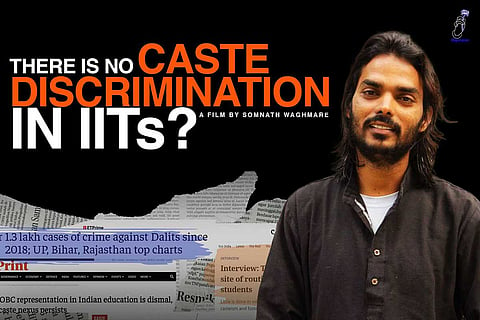

It has been a little over two months since the death by suicide of Darshan Solanki, a Dalit student of BTech in Chemical Engineering at the Indian Institute of Technology (IIT) Bombay. Darshan, Payal Tadvi, Rohith Vemula — the list of young Dalit and Adivasi lives stolen by institutional casteism is long. At the same time, the claim of oppressor communities that caste discrimination doesn’t exist at such elite academic spaces is getting louder.
While the police investigation into Darshan’s death is ongoing, the interim report of IIT Bombay’s enquiry committee has cleared the institute of blame. In the wake of these events comes anti-caste filmmaker Somnath Waghmare’s documentary film There is no caste discrimination in IITs? The film unsparingly describes these deaths for what they are – institutional murders.
The 15-minute documentary, released on April 1, covers the protests held for Darshan immediately after his death at Mumbai’s Azad Maidan. Protestors had demanded the passing of the Rohith Vemula Act, an end to religious and caste-based discrimination, and the prevention of further institutional murders.
The film draws attention to some exceedingly bleak statistics. Referencing an article in The Print, Somnath points out that since 2014, out of the 122 student suicides, 111 occurred at Union government-run universities, IIT, and NITs.
The speech of Ramesh Solanki, Darshan’s father, is central to the film, taking up most of the run time. Ramesh recalled how his son had ambitions of studying at IIT Bombay from his school days. “We didn't even know what IIT means. We are working-class people. But Darshan used to learn about such things through YouTube,” he said.
His is one of the first voices we hear in the film, allowing us to know who Darshan was in ways no news media coverage did. The film tells viewers the vast differences between Darshan’s presence in a place like IIT and that of his caste-privileged fellow students.
Lost in the clamour around denying casteism at first, and then in the deathly silence that has taken its place, is the voice of a parent who lost a child to bigotry. Somnath’s film ensures that his voice is heard.
He also remembers early conversations with Darshan regarding the course he had joined – BTech in Chemical Engineering. “I suggested that he apply to other IITs where he could join a course in something other than Chemical Engineering. But he was adamant about studying in IIT Bombay only. We didn’t know at the time that his stubbornness would be his death,” he said. What he went on to say is starkly different from what the interim report by IIT Bombay’s inquiry committee claimed.
The report, released in March, claimed that the committee had found no evidence of caste-based discrimination. “It appears from the marks obtained in various courses that the performance of DS [Darshan Solanki] deteriorated specifically in the second half of the Autumn semester. His deteriorating academic performance could have affected DS seriously,” the report says. While it does not explicitly blame Darshan’s academic performance for his suicide – the report also says that the committee could not come to final conclusion – the implication is evident.
But that is not how Ramesh, who was the last person to speak to Darshan before his death, remembers his son. “When he called me at 12:30 pm on February 12, he told me that his exam had gone well and that he would come home in two days,” Ramesh said in the film. Darshan had also told his father that he was going to go out with a friend since all his exams were over. The Wire reports that Ramesh, as a “rare indulgence,” had transferred Rs 3000 to his son’s account so that he could enjoy his outing. Darshan died less than 45 minutes after the phone call.
Ramesh’s voice is of even more urgent importance at the time of the film’s release. Five days ago, on April 14, he reportedly wrote to the special investigating team (SIT) with new revelations about Darshan’s death. He had found his son’s Instagram chats that suggested that Darshan feared caste-based discrimination from a classmate who had discovered that he was Dalit.
In his chats with a friend, Darshan had allegedly said that he had told this classmate that he would not have got into IIT Bombay with his Joint Entrance Examination (JEE) score, had he applied through the general category. His fear tracks with the myths propagated by oppressor caste students in the general category that reservation goes against merit.
There is no caste discrimination in IITs? is currently available on YouTube. The film was screened earlier this month at the PK Rosy Film Festival in Chennai, organised by director Pa Ranjith’s Neelam Social in honour of Dalit History Month. Interestingly, the festival also screened We have not come here to die — Deepa Dhanraj’s 2018 film on Rohith Vemula’s death.
How little has changed since Rohith’s death is dismally plain in the words of Ramesh in the film. Fighting back his grief, he recalled the moment he was informed of Darshan’s death: “What do we do now? He had so many things still to give us and this is what we had to hear. I had entrusted my son to the people of IIT. My dreams were entrusted to IIT. Darshan’s dreams were entrusted to IIT. I gave them my son, my flower, so they may nurture him into a plant. Instead they crushed the flower and the plant and threw him away. Why did you crush my flower?”